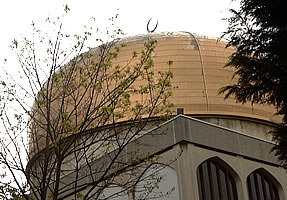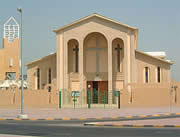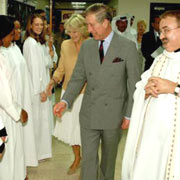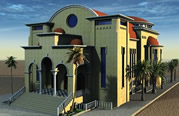|
Editorial
11 November 2007 (note added
on 24 January 2008)
Exhibiting the characteristic
doublethink of mullahs, a United Nations sponsored Shariah
expert flown over for a week to advise the Maldive parliament said
the “ban” on freedom of religion is a “disservice”
to Islam. In the same breath Mohammad Hashim Kamali contradicted
himself by warning against allowing Maldive Muslims to renounce
Islam.
The “freedom of religion” that Mr Kamali referred to
seems to be the observance of non-Islamic faiths by the prominent
expatriate minority that is arguably close to a quarter of the Maldive
population. The Maldive authorities have always insisted, with some
justification, that expatriates have limited freedom of non-Islamic
observances. Between periodic bouts of confiscating and incinerating
Divehi language Bibles and souvenirs that looked like Buddhas to
officials, this has generally been true over the years.

Regent's Park Mosque, London.
Tolerance is one-sided.
Most Western-based Maldivians are fanatically
anti-Western and anti-Christian. While taking advantage of
the religious freedom offered by the West under international
treaty obligations, such people vehemently support the denial
of the same freedoms to non-Muslims in the Maldives, even
though the Maldives is under the same international obligations.
Reciprocating civilised conduct is something alien to these
people.
|
There are long-standing home
churches of expatriate Christians in Malé that meet regularly
and quite openly. From the 1950s until 1976 there was a fully functioning
Christian church in the Maldives catering mainly for British military
personnel and others. In 1965 a Sri Lankan teacher named Gearse
died and the authorities permitted a Christian burial. A colleague
of his by the name of JV William carried a large wooden cross at
the head of the funeral procession that wound through Malé.
A full Christian funeral service was conducted publicly at the Henveyru
cemetery, with all the pupils of his school in attendance.
Also in 1965, a Sri Lankan Buddhist monk, the Venerable Ananda Thero
spent several months in Malé as a guest of the Government
of His Majesty the Sultan of the Maldives. He was there to study
our proud Buddhist heritage that was systematically obliterated
by Islam in the twelfth and the thirteenth centuries. He conducted
several worship sessions for Buddhist expatriates quite openly.
For much of the 1960s and the 1970s, the government-run radio station
in Malé broadcast an evangelical programme, which was relayed
over a public address system in the northern harbour and firewood
market areas. The Maldive authorities also allowed in a Christian
missionary ship called the Logos in the early 1970s. School pupils
were invited on board, ferried across in government transport and
came away with copies of the Bible.
Muslim minorities in the Maldives also had freedom of worship in
days gone by. At one time the biggest mosque in Malé belonged
to an expatriate community. A Shia sect among the Indian traders
who operated in Malé from the 1840s to the 1960s had their
own mosque. It did not bother the Sunni Maldivians of the time that
the biggest mosque in their capital would proclaim, several times
a day, that Ali was the Elect of Allah.

One of many churches in Kuwait, an Arab emirate whose state
religion is Islam |
No significant changes in the
Maldive statutory framework have occurred since these events. The
only change has been the abandoning of our ancient heritage of tolerance
in favour of a culture of jihadist bigotry peddled in by the foreign-funded
medrassas. Someone ought to ask the UN-funded Shariah expert
if he did his homework before making his pronouncements. Does being
a mullah endow any odd foreigner with an Allah-given repertoire
of knowledge of things Maldive, in the space of a week?
No written constitution of the Maldives promulgated since 1932 ever
stated that being a Muslim was a requisite of Maldive citizenship.
Admittedly the relatively recent law on naturalisation of foreign
nationals specifies that applicants for Maldive citizenship have
to be Muslims but no such provision ever existed in the islands’
constitution. For that reason it may be possible to contest that
the Maldive Citizenship Act is unconstitutional.
Maldive constitutions have always defined a citizen as a person
born of a Maldive father or, as was later amended, of a Maldive
parent or one who has been naturalised as a Maldivian. Other provisions
in the constitutions of 1932 - 1997 make it patently clear that
there could be Maldive citizens who are not Muslims. The head of
state was always required to be a Muslim. In later amendments an
increasing number of other officials, such as members of the ministerial
council, were required to be Muslims. If all Maldive citizens were
required to be Muslims, it would not be necessary to have these
constitutional clauses.
On accession to the International Covenant on Civil and Political
Rights on 19 September 2006, the Maldives entered a reservation
to article 18 on freedom of religion or belief. It provides that,
“The application of the principles set out in article 18 of
the Covenant shall be without prejudice to the Constitution of the
Republic of Maldives.” In 2006, the Maldive Attorney General’s
department conceded in writing to the United Nations Special Rapporteur
on freedom of religion or belief that while the Maldive constitution
designates Islam as the state religion, there is in fact no constitutional
provision expressly requiring Maldivians to be Muslim.

His Royal Highness the Prince
of Wales and Her Royal Highness the Duchess of Cornwall being
welcomed by the Christians of Qatar to their new church |
This therefore is a clear acknowledgement
by the Maldive authorities that its reservation of 19 September
2006 does not imply that all Maldivians were required to be Muslims
according to the constitution in force on that date. To amend the
constitution or statutes now to make Islamic profession a requirement
of Maldive citizenship would be clearly illegal under international
law. Maldive members of parliament who advocate such an amendment
would be in breach of their islands’ international treaty
obligations. They would be deemed to be individually and severally
in contempt of International Law.
Responding to Mr Kamali’s fetwa to the Maldive parliament,
Mrs Aneesa Ahmed, spokeswoman for the ruling Maldivian People’s
Party (DRP) and government minister said “We know Islam allows
people of other faiths to worship freely, but because Maldives has
been an Islamic state for centuries, the people want to preserve
that status and we respect their wish.” What Mrs Ahmed was
effectively saying on behalf of her party was that, ‘yes the
prophet Mohamed permitted limited freedom of religion to some non-Muslims,
but we neither care too much about that nor do we tolerate such
nonsense’. So not only is the Maldives giving the one finger
salute to the civilised world, but it is giving it to Islam also.
The opposition Maldivian “Democratic”
Party (MDP) spokesman's response was more typically Maldive. He
said that it would be “political suicide” to advocate
freedom of religion. What he was really saying was that ‘we
in the MDP know our legal and treaty obligations but we are hypocrites
and are too power-hungry to discharge those obligations’.
Other Islamic states that claim
to be 100% Islamic, have recently begun to make overtures to civilization
in an attempt to establish themselves as good citizens of the world.
In 2005 Qatar’s Emir Sheikh Hamad bin Khalifa al-Thani reversed
fourteen centuries of Islamic bigotry by permitting the opening
of a Christian church in his emirate. The Church of the Epiphany
of Qatar now holds regular worship in its brand new US$7m church
complex. Until Islam was imposed over Qatar, the region boasted
a chain of churches and monasteries stretching along the western
shore of the Persian Gulf from the 4th century to the 7th century.

Christianity is being restored to Qatar at a fast rate. This
is a second church planned for the emirate which will be built
by the Orthodox Patriarchate of Jerusalem. It will be called
the St. Isaac and St. George Church of Qatar. Christianity
is the fastest growing religion in the Persian Gulf. Qatar
was formerly 100% Muslim. |
Under a fetwa issued by the
current ruling mullahs the Maldive local language media still insist
on referring to the Pope in the most vulgar terms, if it refers
at all to the Supreme Pontiff of the most populous religion in the
world. By contrast, recently Abdullah bin Abdulaziz, king of Saudi
Arabia and custodian of the Kaaba temple in Mecca and Mohamed’s
mausoleum in Medina made a state visit to the Vatican, seeking an
audience with His Holiness Pope Benedict XVI. The last native Christians
and Jews were either exterminated or expelled from Arabia by the
prophet Mohamed. Bin Abdulaziz may be seeking to give in to civilised
norms, apologise for these historic wrongs against humanity and
follow Qatar’s lead by allowing a church, perhaps in Mecca
or Medina.
That would leave only the Maldives bearing the mantle of bigotry,
digging in and frothing at the mouth in the face of a changing world
order. The resolve in the Maldives to defy the world was recently
demonstrated by the Battle of Badr anniversary terrorist bombers
in Malé who targeted infidel tourists. They told police that
it was their Islamic duty to kill non-Muslims.
This web site is the only media organ with a Maldive theme that
openly and unreservedly advocates the path of embracing all the
freedoms guaranteed by the International Covenant on Civil and Political
Rights. We call on the Maldive government and its opposition to
abandon the path of bigotry and chauvinism. We call on them to grant
its citizens and residents full human rights, as per Article 18
of the Universal Declaration of Human Rights. These rights include
freedom to change one's religion or belief, and freedom, either
alone or in community with others and in public or private, to manifest
one's religion or belief in teaching, practice, worship and observance.
That is the bottom line!
|
24 January 2008
Since this article
was written, an amendment to the Maldive constitution has
been passed that makes Islamic profession a condition of Maldive
citizenship. This provision still remains to become law.
The amendment is ambiguous and clearly contradicts the other
criteria governing citizenship. It is clumsy and represents
frightful legislative draftsmanship. Past Maldive constitutions
were drafted by amateurs compared to the Western qualified
lawyers of today. Lawyers in parliament who voted for the
amendment without dissent, are a liability to their profession.
The amendment is also further acknowledgement that up until
when it becomes law, the Maldive constitution does not require
citizens to be Muslims.
On 19 September 2006 the Maldives acceded to the International
Covenant on Civil and Political Rights making a reservation
stating that the application of Article 18 of the Covenant,
that guarantees religious freedom, will be without prejudice
to the Maldive Constitution. While the current constitution
which was in force at that time clearly allows freedom of
religion, amending it to take away that freedom, more than
a year later is a clear breach of the obligation under the
Covenant. From the moment the amendment becomes law, the Maldives
will be in contempt of International Law.
A law has to be enforceable.
Birth to Maldive parents, naturalisation and voluntary renunciation
of citizenship, according to law, can be quantitatively determined
and verified. Consequently citizenship based on these criteria
can be enforced. On the other hand, profession or otherwise,
of faith in a religion can be kept private by the person who
professes or renounces it. Therefore it would be legally impossible
to quantitatively verify a person’s continued citizenship
based on faith. One can step into the bathroom, for example,
as a Maldivian and emerge as a stateless person and the authorities
will be none the wiser.
top
|
|




 rss feed
rss feed 




